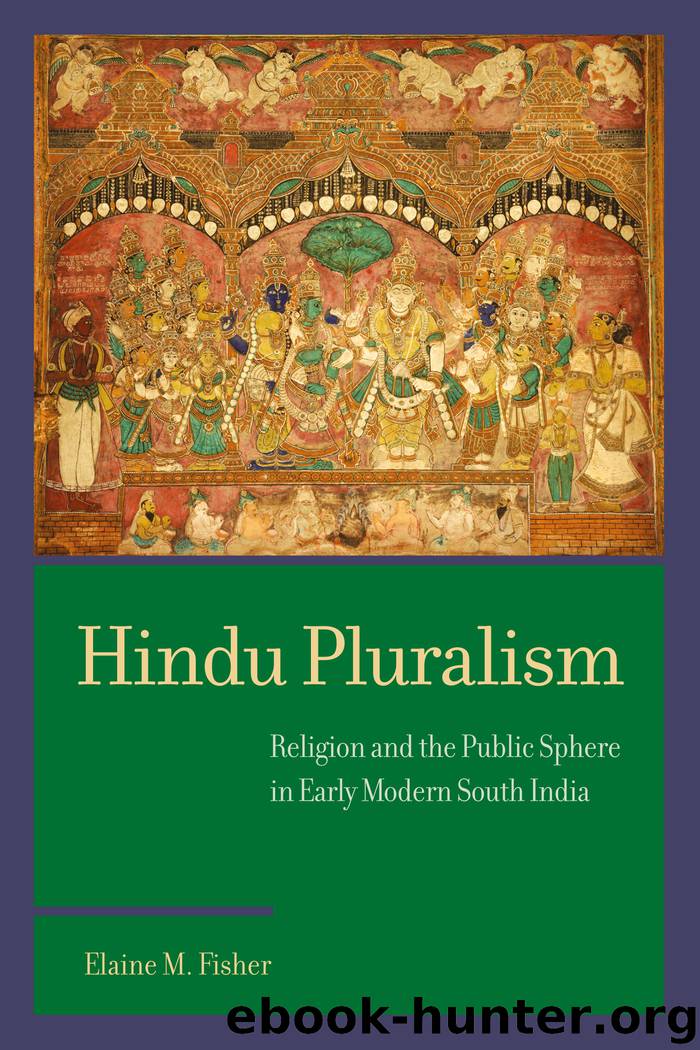Hindu Pluralism by Elaine M. Fisher

Author:Elaine M. Fisher
Language: eng
Format: epub
ISBN: 9780520966291
Publisher: University of California Press.
4
The Language Games of Śiva
Mapping Text and Space in Public Religious Culture
By what process does a text—a product of the written word—depart from the materiality of a palm-leaf manuscript to enter, irrevocably, the domain of public culture? What does it mean for a religious text, a compendium of sacred mythology, to go public, to seemingly cut beyond local publics defined by caste, religion, and even language? These are questions, on one hand, about the sheer dynamics of circulation, the material factors facilitating the spread of knowledge. But on the other hand, these selfsame questions interrogate the very nature of the public itself in early modern India—of space and its relation to the public religious culture that enlivens it with a shared sense of significance.
For the majority of Madurai’s modern-day residents, no work of literature better captures the spirit of the city than does the Tiruviḷaiyāṭal Purāṇam (TVP), or the “Sacred Games of Śiva.” The TVP threads together sixty-four mythological vignettes illustrating Śiva’s divine intervention—in other words, his cosmic play (Skt. līlā, Tamil viḷaiyāṭal)—in the city of Madurai. In the process, the “Sacred Games” effectively maps Madurai’s religious landscape onto the spatial terrain of the city itself, so that its defining topography comes to be seen as shaped by Śiva’s sacred play. It was here, indeed, by the banks of the river that defines the old city, that Śiva set down (vai) his hand (kai) on the ground to quench the thirst of an unruly wedding guest, bringing forth the gushing torrents of Madurai’s Vaikai River. Likewise, on the outskirts of town, to this very day stands the distinctively elephant-shaped Yānaimalai mountain, an elephantine war machine launched by the Jains of Madurai as they assailed their Śaiva adversaries, frozen in place by Sundareśvara, the “Beautiful Lord” Śiva come to earth in the form of Madurai’s king. It is Śiva himself who dwells, alongside his green-skinned consort Mīnākṣī, at the spatial and ritual heart of the city, Madurai’s Mīnākṣī-Sundareśvara Temple, located at the center of both text and landscape. Above all, the temple is home to one of the most extravagant ritual performances in contemporary south India: the wedding of Mīnākṣī and Sundareśvara, the most celebrated of the sixty-four sacred games, brought to life in an annual festival that attracts throngs of pilgrims during the month of Cittirai (April/May).1
And yet, before the sixteenth century, these narratives were scarcely known outside of the elite circles of Tamil literati. One cannot help but wonder, then, how it happened that Madurai as a city came to be entextualized by a single work of Tamil literature. Indeed, the seventeenth-century Tiruviḷaiyāṭal Purāṇam of Parañcōti Muṉivar has come to be accepted by popular religious culture and temple authorities alike as the sole canonical instantiation of the sixty-four sacred games.2 First premiered before a public audience in the Mīnākṣī-Sundareśvara Temple itself, Parañcōti’s TVP is a text inseparable from its context. Parañcōti composed his masterpiece, more than likely, during the reign of Tirumalai Nāyaka, post-Vijayangara regent of Madurai, whose enthusiasm for temple renovation had radically transformed the visual contours of the city center.
Download
This site does not store any files on its server. We only index and link to content provided by other sites. Please contact the content providers to delete copyright contents if any and email us, we'll remove relevant links or contents immediately.
| Chakras | Gandhi |
| History | Rituals & Practice |
| Sacred Writings | Sutras |
| Theology |
Fingersmith by Sarah Waters(2549)
Kundalini by Gopi Krishna(2185)
Wheels of Life by Anodea Judith(2152)
Indian Mythology by Devdutt Pattanaik(1940)
The Bhagavad Gita by Bibek Debroy(1929)
The Yoga of Jesus: Understanding the Hidden Teachings of the Gospels by Paramahansa Yogananda(1862)
Autobiography of a Yogi (Complete Edition) by Yogananda Paramahansa(1827)
The Man from the Egg by Sudha Murty(1823)
The Book of Secrets: 112 Meditations to Discover the Mystery Within by Osho(1677)
Chakra Mantra Magick by Kadmon Baal(1640)
The Sparsholt Affair by Alan Hollinghurst(1591)
Sparks of Divinity by B. K. S. Iyengar(1537)
Gandhi by Ramachandra Guha(1534)
Avatar of Night by Tal Brooke(1525)
Karma-Yoga and Bhakti-Yoga by Swami Vivekananda(1496)
The Bhagavad Gita (Classics of Indian Spirituality) by Eknath Easwaran(1490)
The Spiritual Teaching of Ramana Maharshi by Ramana Maharshi(1433)
Hindoo Holiday by J. R. Ackerley(1386)
Skanda Purana (Great Epics of India: Puranas Book 13) by Bibek Debroy & Dipavali Debroy(1379)
